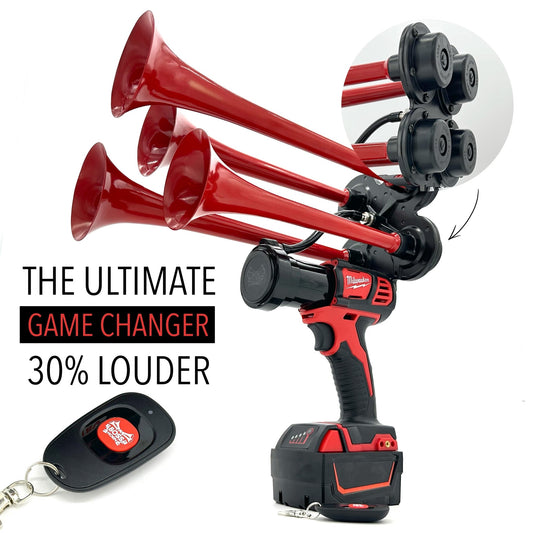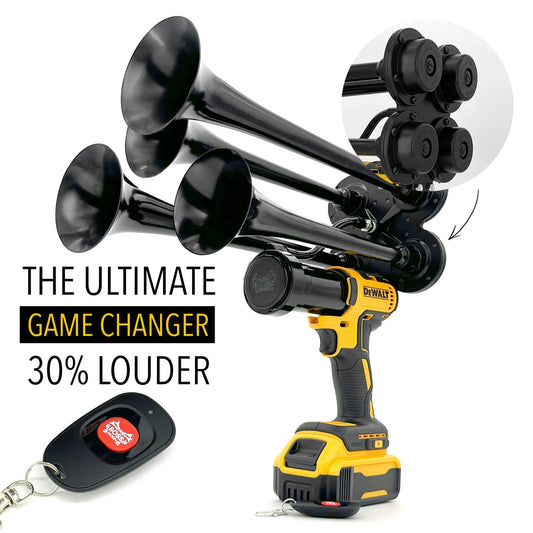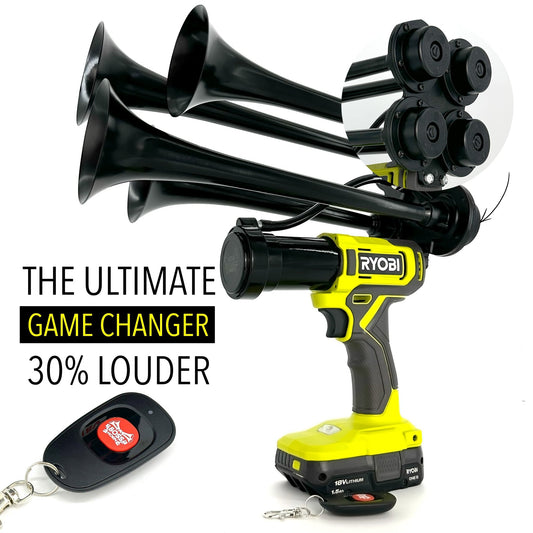In many jurisdictions around the world, there is an ongoing debate over the regulations surrounding a certain type of noise-making device. These devices, commonly used in sporting events, maritime environments, and even vehicles, emit a loud and distinctive sound that can capture the attention of anyone nearby. While these noise-makers can serve important safety or alert purposes, their uncontrolled use has raised concerns among communities and lawmakers alike.
The long history of these sound-emitting devices dates back to the early 1900s when compressed air was first used to produce a loud, attention-grabbing noise. Originally developed to signal emergency situations in industrial settings, air horns quickly found their way into various other domains. Their popularity grew as the technology improved, leading to the creation of portable versions that could be easily carried and utilized in public spaces.
However, as these air horns became more prevalent, concerns started to arise. In many instances, they were used with little regard for others' well-being, leading to noise pollution and disruptions in residential areas. Studies have shown that prolonged exposure to loud noises can have detrimental effects on human health, including hearing loss and increased stress levels. The misuse and abuse of air horns in public places have also led to an increase in public nuisance complaints.
To address these concerns, many jurisdictions have implemented legal measures restricting the use of air horns. While the specific regulations may vary from one place to another, they generally aim to regulate the volume, time, and location of their use to minimize potential harm and annoyance to others. These laws are often enforced by local authorities and can carry penalties for violations.
One notable statistic that sheds light on the urgency of this issue is the number of noise-related complaints that various authorities receive each year. These complaints range from disturbed sleep and lowered quality of life to potential damage to hearing. Such statistics highlight the importance of enacting and enforcing regulations regarding the use of air horns, especially in densely populated areas.
As communities continue to grow and expand, striking a balance between personal enjoyment and consideration for others becomes increasingly important. While air horns can be a valuable tool in certain situations, responsible usage is essential to ensure the well-being of everyone involved. It is crucial for individuals to understand and respect the laws and regulations surrounding these devices, helping to create a harmonious and peaceful environment for all.
Are Air Horns Illegal? Exploring the Legalities and Regulations Surrounding Air Horn Usage
Air horns, a popular sound-emitting device often found in sports events, concerts, and as a safety precaution in marine settings, have been a subject of debate in terms of their legality. Understanding the laws and regulations pertaining to air horns can help shed light on whether or not they are permitted for personal use, and in what scenarios. This article aims to provide a comprehensive overview of the legalities surrounding air horns, addressing various jurisdictions, potential restrictions, and the situations in which they can be used lawfully. By delving into these aspects, readers will gain a better understanding of the topic and be able to make informed decisions about the usage of air horns in their own contexts.
Regulations on Air Horn Usage
When it comes to the use of air horns, there are certain regulations in place to ensure public safety and minimize noise pollution. These regulations vary from country to country and even between different states or provinces within the same country.
United States
In the United States, the regulations on air horn usage are primarily established at the state level. Some states have specific laws that prohibit the use of air horns except in certain circumstances. For example, California Vehicle Code Section 27001 prohibits the use of any "sound signaling device" that emits an unreasonably loud or harsh sound. However, this law does not apply to authorized emergency vehicles or vehicles used for law enforcement purposes.
In other states, such as New York, air horn usage is generally allowed as long as it does not create a public nuisance or violate local noise regulations.
European Union
Within the European Union, there are no specific regulations that address air horn usage on a regional level. Instead, the regulations regarding noise emissions from vehicles are harmonized across the EU member states. The European Union Vehicle Noise Emissions Directive (2007/49/EC) sets noise limits for various types of vehicles, including cars, motorcycles, and trucks. However, it does not specifically address the use of air horns.
Instead, individual member states may have their own regulations governing the use of air horns. For instance, in Germany, the use of an air horn is generally allowed, but it should only be used to warn others of an impending danger. In France, the use of an air horn is strictly prohibited unless the vehicle is specified for emergency services.
Australia
In Australia, the use of air horns is generally prohibited if they produce a sound that is excessive or unreasonably loud. The specific regulations regarding air horns may vary by state or territory. For example, in New South Wales, the use of an air horn is not allowed unless the vehicle is used for emergency services or fitted with a device that prevents excessive sound levels.
In Queensland, the use of an air horn is allowed, but the driver must ensure that it does not cause a disturbance or pose a safety risk. The regulations also outline the specific maximum decibel level allowed for air horns.
The Importance of Compliance
It is crucial for vehicle owners and operators to understand and comply with the regulations surrounding air horn usage. Failure to do so can result in fines, penalties, or even the cancellation of vehicle registrations. Moreover, excessive use of air horns can contribute to noise pollution, disturb the peace, and cause unnecessary annoyance to the public.
Statistics on Air Horn-Related Incidents
- In a study conducted in the United States in 2019, it was found that excessive use of air horns by commercial vehicles accounted for 4.2% of all noise complaints filed.
- According to the Australian Bureau of Statistics, there were 567 reported cases of air horn-related disturbances in 2020.
- In Europe, a survey conducted across multiple countries revealed that 63% of respondents found the use of air horns in non-emergency situations to be highly annoying.
https://youtube.com/watch?v=HFMwF7SeRhg
1. Can I legally use an air horn on my vehicle?
While it is important to adhere to the rules and regulations set by traffic authorities, the legality of using an air horn on your vehicle may vary depending on your jurisdiction. The specific laws and statutes governing the use of air horns can differ from country to country, state to state, or even city to city. To ensure compliance with applicable regulations, it is advisable to consult your local traffic laws or contact the appropriate authorities for accurate and up-to-date information.
Important information:
- Familiarize yourself with the traffic laws in your jurisdiction regarding the use of air horns.
- Contact local traffic authorities for specific guidelines and regulations regarding air horn usage.
- Always prioritize the safety of yourself and others when making choices about vehicle modifications.
2. What factors should I consider before installing an air horn on my vehicle?
Before installing an air horn on your vehicle, there are several crucial factors to consider. First and foremost, you should thoroughly research and understand the legal requirements pertaining to air horn usage in your area. Additionally, it is essential to assess whether the installation of an air horn complies with your vehicle's manufacturer guidelines. Modifying your vehicle in any way may void its warranty or impact its overall performance. Lastly, consider the environment in which you will primarily be using the air horn. In certain residential areas or noise-sensitive zones, using an excessively loud air horn may not be appropriate and could result in fines or penalties.
Important information:
- Understand the legal requirements surrounding air horn usage in your jurisdiction.
- Ensure that the installation of an air horn does not violate your vehicle's warranty or impact its functionality.
- Consider the appropriateness of using a loud air horn based on the environment in which you will be driving.
3. Are there any situations where the use of an air horn is deemed acceptable?
While the use of an air horn should generally comply with local regulations, there are specific scenarios where air horn usage may be considered acceptable. In emergency situations, such as when avoiding an imminent collision or warning other drivers of a hazardous road condition, the use of an air horn can potentially prevent accidents and ensure the safety of yourself and others on the road. However, it is essential to exercise caution and discretion when utilizing an air horn, ensuring that it is used only when absolutely necessary.
Important information:
- Emergency situations may justify the use of an air horn to prevent accidents.
- Exercise caution and consider the potential impact on other drivers before using an air horn.
- Use an air horn sparingly and only when it is absolutely necessary for safety reasons.
4. What are the potential consequences of using an air horn unlawfully?
Using an air horn unlawfully can lead to a range of consequences, varying depending on local regulations and the severity of the offense. The most common consequence is the issuance of a traffic citation or fine, which could result in monetary penalties. In more serious cases, repeated or flagrant violations may lead to the suspension or revocation of your driving privileges. Moreover, disregarding air horn regulations may negatively impact your driving record and potentially increase insurance premiums. It is crucial to comply with traffic laws to avoid these potential consequences.
Important information:
- Unlawful use of an air horn can result in traffic citations or fines.
- Repeated violations may lead to the suspension or revocation of your driving privileges.
- Non-compliance with air horn regulations can negatively impact your driving record and insurance premiums.
5. Are there any alternatives to air horns for signaling purposes?
Yes, there are several alternatives to air horns that can be used for signaling purposes on the road. One commonly used alternative is an electric horn, which produces a similar loud sound but operates without the need for an air compressor. Additionally, vehicles are equipped with standard signaling devices such as horns, turn signals, and emergency hazard lights, which should be used appropriately to communicate with other drivers. Understanding and utilizing these existing signaling tools can help maintain road safety and adhere to legal requirements.
Important information:
- Electric horns can serve as alternatives to air horns for signaling purposes.
- Utilize the standard signaling devices on your vehicle, such as horns, turn signals, and emergency hazard lights.
- Familiarize yourself with proper signaling techniques to effectively communicate with other drivers.
Conclusion
In conclusion, air horns are generally not illegal, but their use is often regulated by local laws. It is important for individuals to check the specific regulations in their area before using an air horn. The key points and insights regarding the legality of air horns include:
- Air horns are powerful devices that produce a loud sound by releasing compressed air.
- There is no federal law in the United States that explicitly prohibits the use of air horns.
- However, local laws and regulations may limit or regulate their usage.
- Many municipal codes restrict the use of air horns in residential areas during specific hours to prevent noise disturbances.
- Air horns are commonly used in various industries such as marine, sports events, and emergency vehicles.
- Some states might have specific restrictions on air horn use in vehicles, primarily related to unnecessary noise or improper use.
- It is advisable to consult the local traffic laws and regulations to determine the legality of using an air horn in a vehicle.
- Misuse of air horns can result in fines or penalties, especially if they are used to intentionally cause annoyance or endanger others.
- Awareness of noise pollution and consideration for others should be a priority when using air horns in any setting.
Remember, it is crucial to familiarize yourself with your local laws to avoid any legal issues and ensure the responsible use of air horns.














